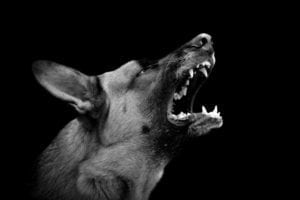 The Court continued in relevant part: On appeal, the Appellate Division affirmed but stated that “the use of the canine unit did not prolong the stop more than reasonably required to complete [the] Title 39 enforcement mission.” The Court granted Nelson’s petition for certification. 233 N.J. 211 (2018).
The Court continued in relevant part: On appeal, the Appellate Division affirmed but stated that “the use of the canine unit did not prolong the stop more than reasonably required to complete [the] Title 39 enforcement mission.” The Court granted Nelson’s petition for certification. 233 N.J. 211 (2018).
Nelson’s traffic stop was prolonged as he waited for the arrival of the canine unit, but the officers had developed the reasonable and articulable suspicion necessary to prolong the stop under State v. Dunbar, 229 N.J. 521, 540 (2017). The Court therefore affirms as modified the Appellate Division’s determination that the evidence seized during the car’s subsequent search should not be suppressed.
The Fourth Amendment of the Federal Constitution and Article I, Paragraph 7 of the New Jersey Constitution guarantee the right to be free from unreasonable searches and seizures. “A lawful roadside stop by a police officer constitutes a seizure under both the Federal and New Jersey Constitutions.” Dunbar, 229 N.J. at 532. During a lawful traffic stop, a police officer is permitted to “inquire into matters unrelated to the justification for the traffic stop.” Id. at 533. If, during the course of the stop or as a result of the reasonable inquiries initiated by the officer, the circumstances give rise to suspicions unrelated to the traffic offense, an officer may broaden the inquiry and satisfy those suspicions
The Court held in Dunbar that “an officer does not need reasonable suspicion independent from the justification for a traffic stop in order to conduct a canine sniff.” 229 N.J. at 540. However, “an officer may not conduct a canine sniff in a manner that prolongs a traffic stop beyond the time required to complete the stop’s mission, unless he possesses reasonable and articulable suspicion to do so.” “In other words, in the absence of such suspicion, an officer may not add time to the stop.”
In light of this holding from the Dunbar case, it is difficult to imagine how the trial judge and appellate panel determined that the canine sniff did not add time to the stop here. The time from the stop to the arrival of the canine was more than 37 minutes. 37 minutes if far longer than the time reasonably required to issue tickets for the lane violation and tailgating.
